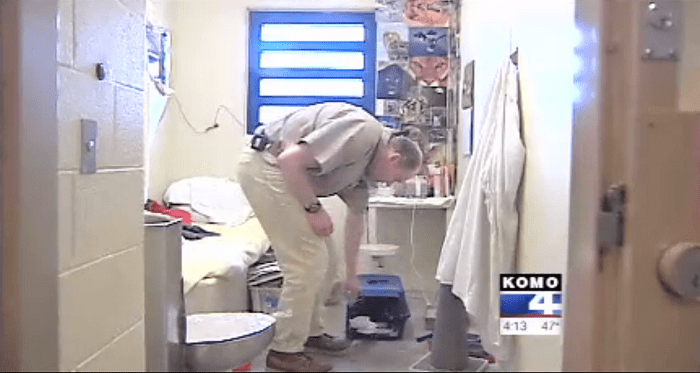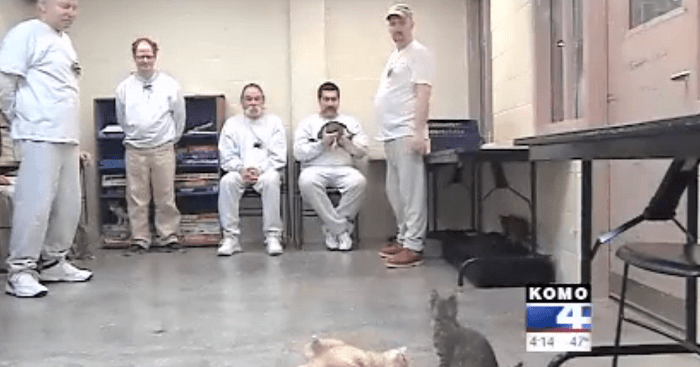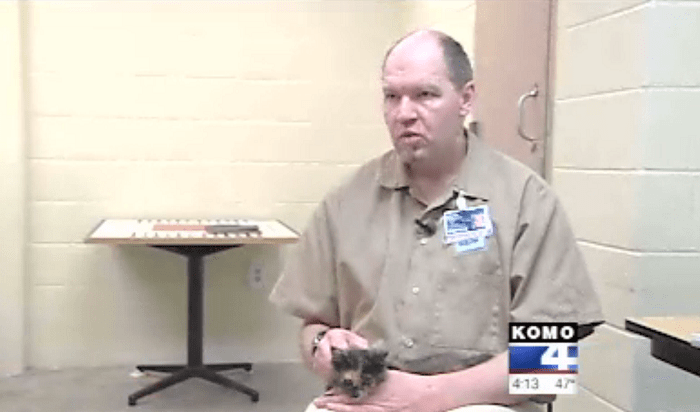Purrfact Pals Cat Shelter in Arlington, Washington knows there is a problem when it comes to adopting out stray and semi-feral cats. They come into rescue having little to no human contact – not exactly the kind of pet most are looking to adopt.
Not to be stopped in their mission to help these kitties learn to love, they found the answer in an unlikely place: The offenders at the Monroe Correctional Complex-Special Offender Unit (MCC-SOU). According to their site, “SOU is a psychiatric prison unit contained within MCC. The SOU E living unit houses 96 mentally ill offenders who enthusiastically welcome the opportunity to provide foster care for the young and/or feral kittens.”

Like many of the dog and prison programs, the goal of the Monroe Corrections Kitten Connections (MCKC) is to help both the human and the feline have a better life.
For example, in order to qualify for the program, the offenders must meet very stringent criteria that includes exemplary behavior, good hygiene, psychiatric stability, a pro-social attitude, and a high level of participation in correctional programs. They are also interviewed by the unit staff and receive training from the Purrfect Pals staff on how to care for their cat charge. (www.purrfectpals.org)

During the training mentioned above, “Each new offender to program is giving a new foster parent orientation,” says Susan Bark, Manager of Foster Care and Shelter Relocation Programs for Purrfect Pals Cat Shelter. “We let them know the correct way to handle shy/scared cats. We also teach them how to read a cat’s body language. We work to show them techniques that help them learn to socialization, such as using a feather wand or cat kibble as a treat. The offenders work as a team together. So the more experienced offenders mentor the new members.”
For the kittens, the benefits are obvious.

“Cats and kittens that arrive at the prison are scared and afraid of people” says Bark. “Kitties who graduate are friendly and socialized, have learned to trust people and are ready for adoption! It’s a win-win for the kitties and the offenders.”
The cats stay at the prison for as long as they need to become socialized, Bark explained to us. Most kittens under 12 weeks need about a month – older kittens usually around two to four months and adult cats can take several months, she adds.
Purrfect Pals checks on their progress often. “My volunteer, Karen Stone, and I visit the Monroe prison every Tuesday, and check on the status of our cats and kittens,” Says Bark. “This helps the offenders receive regular support from us and ensures out cats and kittens stay healthy too.”
Since it started in 2006, MCKC has had over 679 cats in the program and they are expecting to reach 700 by the end of 2015. Purrfect Pals is currently fundraising to build a new two-story, 4,000 square-foot building, for their rescue that will enable them to save more cats and kittens. If you would like to learn more or donate, please visit their website.

